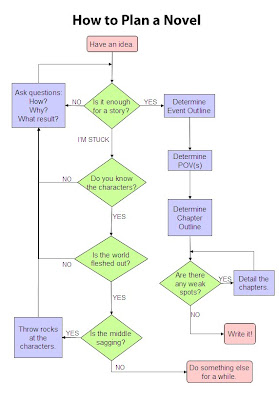It took me 19 months from word 1 to word 99,675 on
Air Pirates. I
told you I'd talk about the process, so here it is.
I write these kinds of posts to analyze my own process, to see what works and what doesn't and hopefully to improve. I hope other people can glean something useful from this as well, but if not, no worries.
This post is also an excuse for me to make charts. I like charts.

I started writing
Air Pirates officially in September 2007. I'd been thinking about it for a lot longer than that (I have documents dating back to 2003), and I'm still not finished with it (the editing phase is a lot harder than I remember), but the first draft took about a year and a half to write.
You can see I had a slow start, and a plateau in early 2008 that I'll explain in a second. This next chart shows that more clearly. It's a chart of how many words I wrote in each month.

Clearly there's an upward trend, but it's pretty unstable. I'd write well for 2-3 months, then stop for 2-3 months, and so on. Here's how it went down.
Aug-Oct 07 (Slow): It took me 3 or 4 drafts to get the beginning, and rewrites weren't counted towards the final word count. Once I figured out how the story started, it got easier.
Feb-Apr 08 (Slow): At this point, I'd written four chapters of
Air Pirates and needed to outline the rest of the story if I was going to get anywhere.
Travelers also came back from the betas and for the first time I started seriously editing and working on queries.
May-Jul 08 (Fast): I really think the reason for my increase here was that I started thinking like a pro. In working on my query, and trying to figure out what to do next, I'd begun reading blogs like
Nathan Bransford and
Query Shark, as well as author's blogs. I learned a lot about writing good query letters, but also the publishing business as a whole. More than anything, I learned that this was something I really wanted to do.
Aug-Sep 08 (Slow): I tried writing a short story in the
Air Pirates' world. I'd never written a short story for the purpose of publication before, so it took a lot of time (and it still isn't published).
Our trip to the US slowed things down a bit too.
Oct-Apr 09 (Fast, mostly): The increase in word count here is most likely due to my wife's commitment to me. She started helping me get away for 2 hours a day, most days, just to write. I still wrote in whatever stolen moments I could, but having 2 undistracted hours really helped me discipline myself. I want to blame the dip here on holiday visitors, but I think it was due more to my lack of self-discipline than anything. I'm trying to get better at that.
Final Analysis. On average, I wrote 5,000 words a month on Air Pirates. I know that, with discipline, I can do 10,000 a month pretty regularly. Hopefully that means I can draft a novel in 9-10 months, but we'll see. I won't be doing any drafting for a while yet until I can get through all this editing I'm supposed to be doing.







